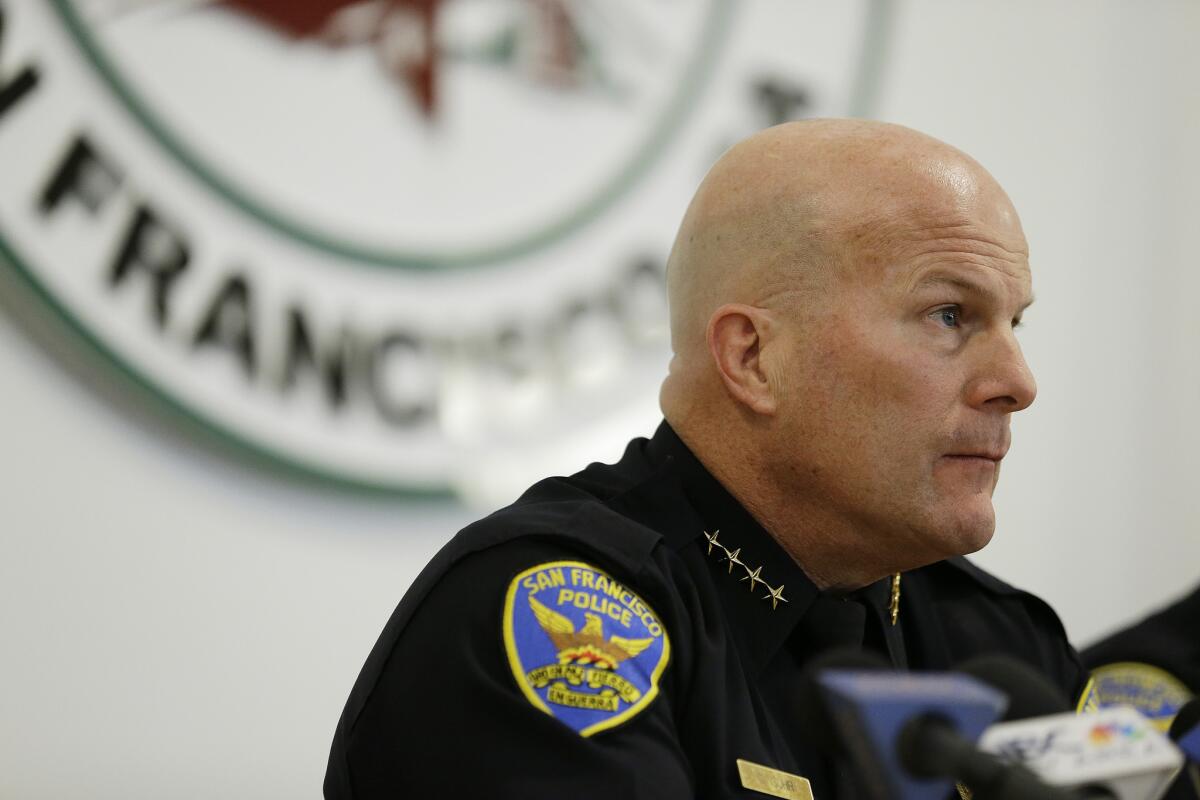Feds fault San Francisco police for violence against minorities and recommend 272 reforms

- Share via
Though the city prides itself on its progressive values, San Francisco’s Police Department has found itself engulfed in the same outrage over brutality and racial bias that has swept other cities from Baltimore to El Cajon.
A six-month study by the U.S. Justice Department released Wednesday found that the department disproportionately used force on people of color, and stopped and searched them more often than it did white people.
Federal officials reviewed 548 use-of-force cases between May 2013 and May 2016, finding 37% of the people whom city police used force against were African American, a larger percentage than for any other ethnic group. Nine of the 11 people who were killed during use-of-force incidents in that time frame were people of color.
Mayor Ed Lee requested the report after Mario Woods, a black man suspected of assault, was shot at least 21 times by police in 2015 while holding a knife.
Federal officials made 272 separate recommendations for reform in the report, including better training with batons to non-fatally subdue suspects with knives.
The study found that the department did not properly investigate officer use-of-force incidents, does not keep “complete and consistent officer-involved shooting files,” and generally had outdated information technology systems and tools to identify patterns of misconduct. Instead of submitting information to a searchable digital database, San Francisco police officers write their use-of-force reports in paper logs.
Federal investigators also discovered that while black and Latino drivers were more likely to be pulled over than white drivers, they were “less likely to be found with contraband.”
Other key findings: The department was not transparent about officer discipline, completing only one investigation into the deadly use of force during the three-year period — and an analysis of 500 use-of-force incidents showed city police officers properly categorized the type of force used on only five occasions.
Lee praised the report during a Wednesday morning news conference, calling it the first step toward an improved and more inclusive department.
“I’m proud to report that the San Francisco Police Department will accept and implement every single recommendation,” he said. “We must restore trust, and these measures are important steps forward.”
John Burris, the attorney representing Woods’ relatives, said the report could mark a turning point for a law enforcement agency that has been resistant to reform.
“Despite this notion of San Francisco being a modern place, this department is anything but modern,” Burris said.
The report, he said, “sort of opened the department, opened its guts up if you will, and much of what they opened up was not a pretty sight to see.”
Ronald Davis, director of the Department of Justice’s Community Oriented Policing Services department, which conducted the report, said in a statement that it “makes clear the significant challenges that lie ahead for the Police Department and the city.”
“More than 90 findings outlined in the report reflect key operational deficiencies in the Police Department,” he continued.
The report comes as the Police Department grapples with two incidents in which at least 17 officers were found to have sent racist texts “of such extreme bias” that the police chief questioned whether they could serve on the force.
In April, defense attorneys revealed that three San Francisco officers used the N-word to refer to black people, “rag heads” to refer to people of Middle Eastern descent and “beaners” to refer to Latinos. By then, the three had left the force.
“When we’re talking about bias policing and racial profiling, there is a direct connection to these associations being made by officers,” San Francisco Public Defender Jeff Adachi said at the time. “That’s the kind of mentality that tells you it’s OK to shoot, OK to kill, OK to arrest” people of color.
A federal court filing last year disclosed that 14 other officers had either sent or received racist text messages in previous years.
The ensuing scandal forced prosecutors to dismiss 13 pending criminal cases and review 3,000 more. A judge ruled the officers could not be fired because the department had waited too long to discipline them.
In May, at the mayor’s request, Police Chief Greg Suhr resigned in the midst of the scandal and hours after a police officer fatally shot an unarmed black woman in the Bayview neighborhood.
Federal intervention in local policing has become more common in recent years, as a national debate about the use of force against people of color has led to protests and calls for greater transparency after several controversial shootings.
But the findings in San Francisco are not binding, unlike those issued in Ferguson, Mo., and Cleveland after other incidents in which law enforcement agencies were criticized for allegedly excessive use of force.
The Associated Press contributed to this report.
ALSO
Judge decides against a mistrial in civil rape case against NBA star Derrick Rose
Death of LAPD detective investigating Derrick Rose rape allegations called likely suicide
Anaheim settles discrimination lawsuit from city’s first Latina attorney for $1.45 million
UPDATES:
3:30 p.m.: This article was updated with additional details from the report and quotes from John Burris
4:20 p.m.: This article was updated with staff reporting and comments from a Bay Area civil rights attorney.
This article was originally published at 11:20 a.m.
More to Read
Sign up for Essential California
The most important California stories and recommendations in your inbox every morning.
You may occasionally receive promotional content from the Los Angeles Times.












